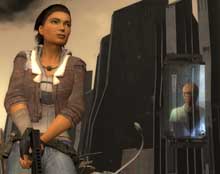Changing the way video games are made Longer titles may become less common as developers adopt a 'Saturday matinee' model. NEW YORK (CNNMoney.com) -- The days of the Saturday matinee may have long faded from the local cinema, but they could be rising again in the world of video games like "Half-Life 2" and "Halo." Cliffhangers, which have been somewhat rare in games of yore, have come into vogue in the last few years - and the rise of episodic gaming hints we may be seeing a lot more of them.
(Note: The following paragraphs discuss the ending of several games as well as events that will unfold in "Half-Life: Episode Two". If you'd prefer to be surprised, skip forward a bit.) 2004 really kicked off the trend in earnest. "Halo 2" left Microsoft (Charts) Xbox players hanging (and more than a few pretty ticked off) with the Master Chief, stowed aboard an enemy ship, promising to "finish the fight" as the player learned an invasion of Earth was imminent. "Half-Life 2" ended literally in mid-explosion, with the fate of a major character in the air. "Halo" players will finally get to help the game's protagonist finish that fight next holiday, when "Halo 3" ships. "Halo 3" will be a full scale release, however. Valve Software has opted for another track. Using Steam, its proprietary online distribution service, Valve is doling out the next chapters in the Half-Life saga in shorter episodes (typically six or seven hours of gameplay versus 60). It lets the company update the story more quickly - and lets them incorporate player feedback into new episodes. "Steam gives us a real time connection with our customers," said Newell. "Rather than guessing how people are playing our game, we can watch and see them navigate through the game. We can see them get stuck at various points and say 'oh, that's not what we designed' and work to correct that (in our next installment)." It also lets them take some risks. For example, in the next episode of "Half-Life 2" (due in the first quarter of next year) Valve plans to kill off one of the franchise's regular characters. Making such a move, particularly with characters that have become beloved in a major franchise is a risky one. But Newell said by introducing such a shocking twist, it can help the "Half-Life" story from becoming "just another watered-down serialized narrative." "I think we want them to care about these characters and want them to trust that we're doing something smart with these stories," he said. "We want them to be genuinely be worried about the characters, so you won't think 'Well they won't do something to these characters, because they're too important.' If nothing matters, then nothing you do matters - and you're moving away from being in a world and back to being in a shooting gallery." (Still afraid of spoilers? It's safe to start reading again.) Whether Valve will continue with episodic content after "Episode Three" hasn't yet been decided. The company knew its fans would likely buy the first installment regardless. But they don't know if players will stick with the formula. "So far the feedback has been really positive and led me to believe we'll be continuing to do this in the future," acknowledged Newell. "But we want to get these three out, then sit back and do a post mortem. ... We're really interested in trying this, then sitting down with some customers and asking them 'Do you want a TV series or do you want movies - or a mixture of both?' It's like they've had a diet of feature length experiences for a long time and this is their first chance to try something different." There are notable downsides to going episodic with video games. Players, who have been trained to expect 20 to 60 hours of gameplay per title, might reject the model, even though it's lower priced. Critics tend to penalize episodic games because of their length. And retailers don't quite know how to handle the games. Because the average title sells for $50 or $60 these days, a new game carrying a $20 price tag can make the others seem overpriced. $20 is typically bargain bin pricing for games - and stores are still trying to figure out how to position them. Online services like Steam and Xbox Live Marketplace, help supplement sales, but Newell said the majority of all sales still come from retailers - even on episodic content. (It's not just "Half-Life," either. Valve worked with Texas developer Ritual to distribute "SiN: Episodes - Emergence" earlier this year. A second installment is due soon. Episodic gaming is hardly a new phenomenon in the gaming world. Electronic Arts (Charts) tried it in 1998, offering episodes of its "Wing Commander" franchise online, then again with the alternate reality game "Majestic." Still, with its recent successes and technological advances, more and more publishers are giving the model another chance. The biggest endorsement came last week, when Take Two Interactive Software (Charts) announced plans to ship two follow-up episodic chapters for "Grand Theft Auto 4" for Xbox 360 owners. And developer Telltale Games will release a series of episodic "Sam & Max" games online, initially on Time Warner's (Charts) GameTap service. A 'Survivor' for gaming? "Grand Theft Auto" makes the leap. Morris is Director of Content Development for CNNMoney.com. Send him an email at chris.morris@turner.com |
| |||||||||||||||



